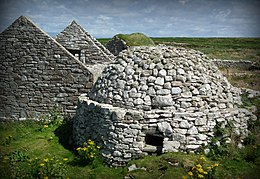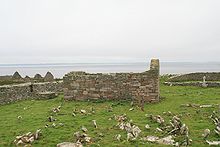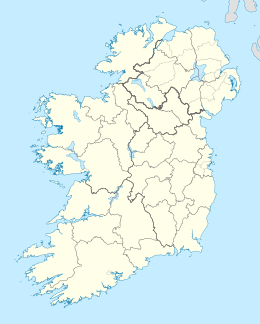Inishmurray (Irish: Inis Muireadheach, meaning 'Muireadheach's island'[1] or Irish: Inis Muirígh)[2][3][4] is an uninhabited island situated 7 km (4 mi) off the coast of County Sligo, Ireland.
 Early Medieval Ecclesiastical Site | |
| Geography | |
|---|---|
| Location | Atlantic Ocean |
| Coordinates | 54°26′N 8°40′W / 54.433°N 8.667°W |
| Area | 0.9 km2 (0.35 sq mi) |
| Administration | |
| Province | Connacht |
| County | Sligo |
| Demographics | |
| Population | 0 (2011) |

Geography
editThe island covers .9 square kilometres (0.3 sq mi).[5]
Etymology
editInishmurray may be named after the early saint, Muiredach mac Echdach (fl. early 6th century) of Killala.[6]
History
editThere are remains of an early Irish monastic settlement. Laisrén (Saint Molaise) Mac Decláin reputedly founded a monastery here in the 6th century.[7] He was confessor of Saint Columba (Colmcille) after the Battle of Cúl Dreimhne on the mainland nearby. His feast day is 12 August.[6]
The island's ecclesiastical settlement was attacked in 795[8] and again in 807 by the Vikings,[9] and eventually the monks abandoned the island and it remained uninhabited until the first secular settlement, probably in the 12th century.[5]
Monastery
editThe enclosure wall is impressive - reaching 4.5 metres (15 ft) in height at its highest point and up to 3 metres (9.8 ft) thick.[10] The site contains various ecclesiastical buildings including enclosures, a stone-roofed oratory, two churches, a clochán, a large beehive-shaped cell, a holy well and other remains including cross slabs suggesting foreign influences. The whole complex is composed of what is probably local sandstone rubble.[5]
Recent history
editThe local population peaked at just over 100 in the 1880s but the last residents moved out to the mainland on 12 November 1948. Some of the buildings are still visible including 15 houses and the island's school. The site remained a pilgrimage destination right up to recent times. In 2018, the Marine Survey Office of the Department of Transport, Tourism and Sport caused controversy when it banned commercial operators from landing visitors on the island, due "to concerns for safety during embarking and disembarking".[7]
See also
editLiterature
edit- Jerry O'Sullivan and Tomas O Carragain: "Inishmurray: Monks and Pilgrims in an Atlantic Landscape", Collins, Cork, 2008, ISBN 9781905172474 (v. 1)
- Joe McGowan: Inishmurray: Island Voices, Aeolus Publications, 2004, ISBN 0-9521334-3-1.
- John Haywood: The Historical Atlas of the Celtic World, Thames & Hudson, 2009, ISBN 978-0-500-28831-3.
- H.Th. De Booy: Het spook van Inish Murray (Ghost at Inishmurray - fiction). Deltos Elsevier, Amsterdam/Brussel 1971, ISBN 978-9-010-05509-5.
References
edit- ^ Coyle, Cathal (September 2017). Little Book of Irish Landmarks. The History Press. p. 23. ISBN 9780750985208. Retrieved 7 May 2020.
- ^ "Ballygilgan (Lissadell) Nature Reserve". National Parks and Wildlife Service (Ireland). Retrieved 7 May 2020.
- ^ DeAngelis, Camille (May 2017). Moon Ireland. Avalon Publishing. p. 729. ISBN 9781631214219. Retrieved 7 May 2020.
- ^ "Inis Muirígh/Inishmurray". Placenames Database of Ireland (logainm.ie). Department of Culture, Heritage and the Gaeltacht and Dublin City University. Retrieved 7 May 2020.
- ^ a b c "Inshmurray monastic site". Voices from the Dawn. Retrieved 11 March 2020.
- ^ a b "Killala". The Catholic Encyclopedia. Vol. 8. Robert Appleton Company, New York. 1910. Retrieved 11 March 2020.
- ^ a b McDonagh, Marese (23 April 2018). "Minister to intervene in row over access to historic island". The Irish Times. Retrieved 11 March 2020.
- ^ Roesdahl, Else (2016). The Vikings (Third ed.). Penguin Books. p. 232. ISBN 978 0 141 98476 6.
- ^ Gwynn, Aubrey; Hadcock, R.N. (1970). Medieval Religious Houses: Ireland. Longman, London. p. 387. ISBN 0-582-11229-X.
- ^ Heraughty, Patrick (1982). Inishmurray: Ancient Monastic Island. O'Brien, Dublin. p. 23. ISBN 0-86278-473-5.
External links
editMedia related to Inishmurray at Wikimedia Commons
